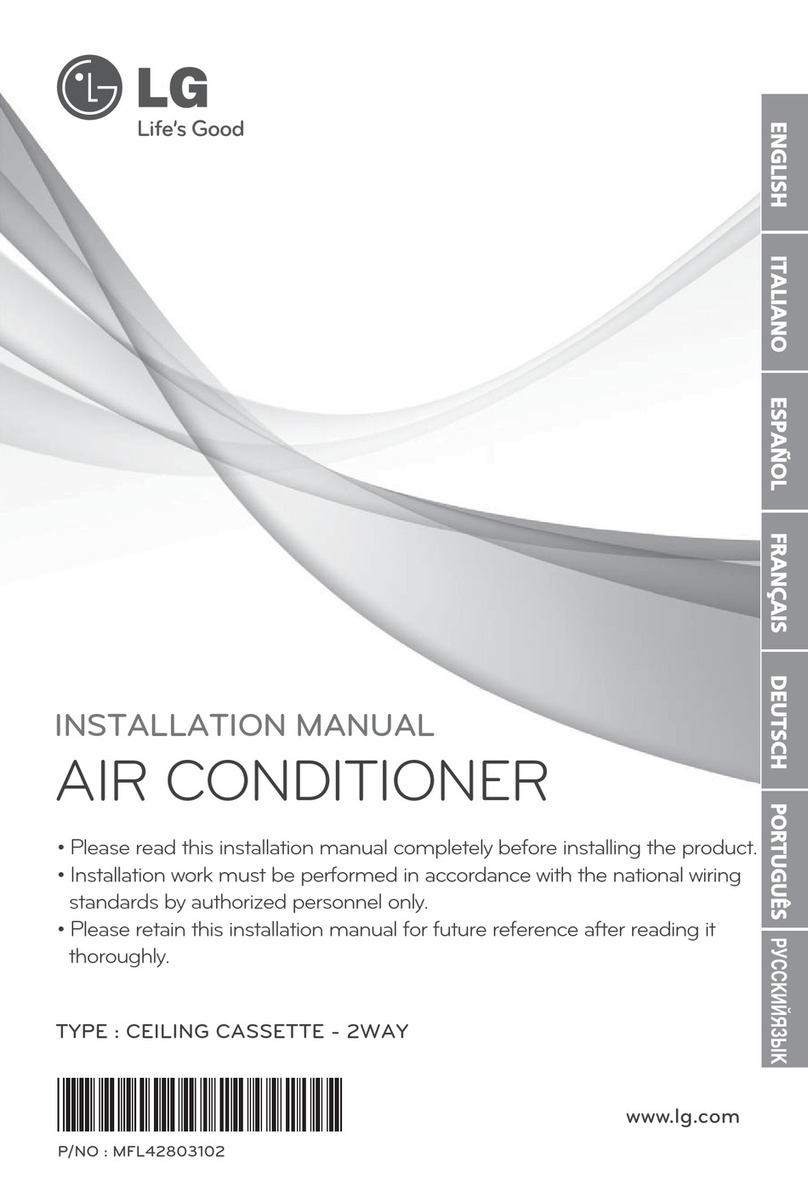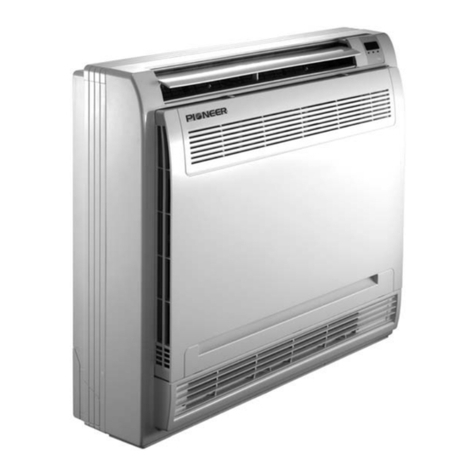EURGEEN OL-BKY26-A4 User manual

Local Portable Air Conditioner
Owner’s Manual
Original instructions
Model:OL-BKY26-A4
(With R290 refrigerant)
READ AND SAVE THESE INSTRUCTIONS

2
CONTENTS
1. BEFORE YOU BEGIN ................................................. 03
2. FOR YOUR SAFETY..................................................... 05
3. PRODUCT OVERVIEW................................................. 10
4. INSTALLATION .......................................................... 12
5. OPERATION ............................................................... 17
6. CLEANING AND CARE................................................. 23
7. TROUBLESHOOTING .................................................. 25
8. DECOMMISSIONING .......................................................26

3
1. BEFORE YOU BEGIN
1.1 PRODUCT DESCRIPTION
Our powerful portable air conditioners are great cooling solutions for single
rooms, creating a comfortable atmosphere in your space. It also has
ventilation and dehumidifying function for circulating air and removal of
moisture. They're self-contained systems that do not require any permanent
installation allowing you to move to the space in which it is most needed.
They're commonly used in kitchen, temporary-resided, computer rooms,
garages, and many other places where installation of Air-conditioner Outdoor
Unit is limited.
The environmentally friendly R290 is used as the refrigerant. R290 has no
damaging influence on the ozone layer (ODP), a negligible greenhouse effect
(GWP) and is available worldwide. Because of its efficient energy properties,
R290 is highly suitable as a coolant for this application. Special precautions
must be taken into consideration due to the coolant's high flammability.
1.2 SYMBOLS FROM THE UNIT AND USER MANUAL
warning
This unit uses a flammable refrigerant.
If refrigerant leaks and comes in contact with fire or heating
part, it will create harmful gas and there is risk of fire.
Read the USER MANUAL carefully before operation.
Further information is available in the USER MANUAL,
SERVICE MANUAL, and the like.

4
Service personnel are required to carefully read the USER
MANUAL and SERVICE MANUAL before operation.

5
THE FOLLOWING SHOULD ALWAYS BE OBSERVED FOR SAFETY
This appliance is intended to be used by expert or trained users in
shops, in light industry and on farms, or for commercial use by lay
persons.
This appliance can be used by children aged from 8 years and above
and persons with reduced physical, sensory or mental capabilities or
lack of experience and knowledge if they have been given supervision
or instruction concerning use of the appliance in a safe way and
understand the hazards involved. Children shall not play with the
appliance. Cleaning and user maintenance shall not be made by
children without supervision.
The unit is designed only for use with R-290(propane) gas as
the designated refrigerant.
The refrigerant loop is sealed. Only a qualified technician
should attempt to service!
Do not discharge the refrigerant into the atmosphere.
R-290 (propane) is flammable and heavier than air.
It collects first in low areas but can be circulated by the fans.
If propane gas is present or even suspected, do not allow
untrained personnel to attempt to find the cause.
The propane gas used in the unit has no odor.
The lack of smell does not indicate a lack of escaped gas.
If a leak is detected, immediately evacuate all persons from the
store, ventilate the room and contact the local fire department
to advise them that a propane leak has occurred.
Do not let any persons back into the store until the qualified
service technician has arrived and that technician advises that it
is safe to return to the store.
No open flames, cigarettes or other possible sources of ignition

6
should be used inside or in the vicinity of the units.
Component parts are designed for propane and non-incentive and
non-sparking. Component parts shall only be replaced with identical
repair parts.
FAILURE TO ABIDE BY THIS WARNING COULD RESULT IN AN
EXPLOSION, DEATH, INJURY AND PROPERTY DAMAGE.

7
2. FOR YOUR SAFETY
Your safety is the most important thing we concerned!
2.1 OPERATIONALPRECAUTIONS
WARNING- to reduce the risk of fire, electric shock or injury to persons
or property:
If the supply cord is damaged, it must be replaced by the manufacturer, its
service agent or similarly qualified persons in order to avoid a hazard.
The A-weighted sound pressure level is below 55 dB.
The appliance shall be disconnected from its power source during service.
Always operate the unit from a power source of equal voltage, frequency
and rating as indicated on the product identification plate.
Always use a power outlet that is grounded.
Unplug the power cord when cleaning or when not in use.
Do not operate with wet hands. Prevent water from spilling onto the unit.
Do not immerse or expose the unit to rain, moisture or any other liquid.
Do not leave the unit running unattended. Do not tilt or turn over the unit.
Do not unplug while the unit is operating.
Do not unplug by pulling on the power cord.
Do not use an extension cord or an adapter plug.
WARNING
Please read this manual carefully and fully
understand before operating your dehumidifier.

8
Do not put objects on the unit.
Do not climb or sit on the unit.
Do not insert fingers or other objects into the air outlet.
Do not touch the air inlet or the aluminum fins of the unit.
Do not operate the unit if it is dropped, damaged or showing signs of
product malfunction.
Do not clean the appliance with any chemicals.
Ensure the unit is far away from fire, inflammable, or explosive objects.
The unit shall be installed in accordance with national wiring regulations.
Do not use means to accelerate the defrosting process or to clean, other
than those recommended by the manufacture.
The appliance shall be stored in a room without continuously operation
sources (for example: open flames, an operating gas appliance or an
operating electric heater).
The appliance shall be stored so as to prevent mechanical damage from
occurring.
Do not piece or burn, even after use.
Be aware that refrigerants may not contain an odour.
Pipe-work shall be protected from physical damage and shall not be
installed in an unventilated space, if that space is smaller than 12m².
Compliance with national gas regulations shall be observed.
Keep any required ventilation openings clear of obstruction.
The appliance shall be stored in a well-ventilated area where the room size

9
corresponds to the room area as specified for operation.
WARNING
Any person who is involved with working on or breaking
into a refrigerant circuit should hold a current valid
certificate from an industry-accredited assessment
authority, which authorizes their competence to handle
refrigerants safely in accordance with an industry,
recognized assessment specification.
WARNING
Servicing shall only be performed as recommended by
the equipment manufacturer. Maintenance and repair
requiring the assistance of other skilled personnel shall
be carried out under the supervision of the person
competent in the use of flammable refrigerants.
If you don't understand something or need help, please contact the dealer
services.

10
2.2 SAFETY PRECAUTIONS ON SERVICING
Please follow these warnings when to undertake the following when servicing
an appliance with R290.
2.2.1 Checks to the area
Prior to beginning work on systems containing flammable refrigerants, safety
checks are necessary to ensure that the risk of ignition is minimized. For
repair to the refrigerating system, the following precautions shall be complied
with prior to conducting work on the system.
2.2.2 Work procedure
Work shall be undertaken under a controlled procedure so as to minimize the
risk of a flammable gas or vapor being present while the work is being
performed.
2.2.3 General work area
All maintenance staff and others working in the local area shall be instructed
on the nature of work being carried out. Work in confined spaces shall be
avoided. The area around the work space shall be sectioned off. Ensure that
the conditions within the area have been made safe by control of flammable
material.
2.2.4 Checking for presence of refrigerant
The area shall be checked with an appropriate refrigerant detector prior to
and during work, to ensure the technician is aware of potentially flammable
atmospheres. Ensure that the leak detection equipment being used is
suitable for use with flammable refrigerants, i.e. no sparking, adequately
sealed or intrinsically safe.
2.2.5 Presence of fire extinguisher
If any hot work is to be conducted on the refrigeration equipment or any
associated parts, appropriate fire extinguishing equipment shall be available

11
to hand. Have a dry powder orCO2 fire extinguisher adjacent to the charging
area.
2.2.6 No ignition sources
No person carrying out work in relation to a refrigeration system which
involves exposing any pipe work that contains or has contained flammable
refrigerant shall use any sources of ignition in such a manner that it may lead
to the risk of fire or explosion. All possible ignition sources, including
cigarette smoking, should be kept sufficiently far away from the site of
installation, repairing, removing and disposal, during which flammable
refrigerant can possibly be released to the surrounding space. Prior to work
taking place, the area around the equipment is to be surveyed to make sure
that there are no flammable hazards or ignition risks. “No Smoking” signs
shall be displayed.
2.2.7 Ventilated area
Ensure that the area is in the open or that it is adequately ventilated before
breaking into the system or conducting any hot work. A degree of ventilation
shall continue during the period that the work is carried out. The ventilation
should safely disperse any released refrigerant and preferably expel it
externally into the atmosphere.
2.2.8 Checks to the refrigeration equipment
Where electrical components are being changed, they shall be fit for the
purpose and to the correct specification. At all times the manufacturer’s
maintenance and service guidelines shall be followed. If in doubt consult the
manufacturer’s technical department for assistance.
The following checks shall be applied to installations using flammable
refrigerants:
– The charge size is in accordance with the room size within which the
refrigerant containing parts are installed;
– The ventilation machinery and outlets are operating adequately and are
not obstructed;

12
– If an indirect refrigerating circuit is being used, the secondary circuit shall
be checked for the presence of refrigerant;
– Marking to the equipment continues to be visible and legible. Markings and
signs that are illegible shall be corrected;
– refrigeration pipe or components are installed in a position where they are
unlikely to be exposed to any substance which may corrode refrigerant
containing components, unless the components are constructed of materials
which are inherently resistant to being corroded or are suitably protected
against being so corroded.
2.2.9 Checks to electrical devices
Repair and maintenance to electrical components shall include initial safety
checks and component inspection procedures. If a fault exists that could
compromise safety, then no electrical supply shall be connected to the circuit
until it is satisfactorily dealt with. If the fault cannot be corrected
immediately but it is necessary to continue operation, an adequate
temporary solution shall be used. This shall be reported to the owner of the
equipment so all parties are advised.
Initial safety checks shall include:
-those capacitors are discharged: this shall be done in a safe manner to
avoid possibility of sparking;
-that there no live electrical components and wiring are exposed while
charging, recovering or purging the system;
-that there is continuity of earth bonding.
WARNING!
Install the unit in rooms which exceed 10 m².
Do not install the unit in a place where inflammable gas may
leak.
NOTE!

13
The manufacture may provide other suitable example or may
provide additional information about the refrigerant odour.

14
3. PRODUCT OVERVIEW
3.1 PRODUCT DIAGRAM
FRONT VIEW
BACK VIEW
1 Recessed
handle 4 Air inlet with
air filter 7
Air inlet with air
filter
2
Control panel
with signal
receptor
5 Air Exhaust 8 Drain opening
with sealing plug
3
Air outlet with
adjustable
louver
6 Power cord box
Note: The appearance is only for reference. Please see the real product for detailed
information.
2
3
8
5
7
4
6
1

15
3.2
FEATURES
High Capacity in a compact size with cooling, dehumidifying and
ventilating function.
Temperature setting and display
Electronic control with built-in timer, sleep mode
Self-evaporating system
Auto shut off when tank full
Continuous drainage option
2- speed fan
Casters for easy mobility
Automatic restart in the event of power outage
Auto defrosting function
at low ambient temperatures
Remote control
3.3
SPECIFICATIONS
MODEL
OL-BKY26-A4
Cooling Capacity
9000 Btu
Power Supply
AC220-240V/50Hz
Cooling Rated Input
Power/Current 950W/4.3A
Sound Pressure
Level ≤55 dB(A)
Maximum
Refrigerant Charge R290/200g

16
Net Weight
26.0 kg
Maximum Design
Pressure
HighSide:3.2MPa
LowSide:0.7MPa
Minimum Room Size
10 m2 (Floor area)
Dimension
320*320*740mm
Fuse type and
rating:
T-Type, AC 250V,
3.15A

17
4. INSTALLATION
4.1 Unpacking
Unpack the carton and take the appliance and accessories out.
Check the device after unpacking for any damage or scratches on it.
Accessories:
1. Exhaust hose
2. Hose connector
3. Window kit adapter
4. Remote control
5. Window kit
6. Drain hose

18
4.2 Choose your location
Place the unit on a firm, level surface in an area with at least 50cm of
free space around it allow for proper air circulation.
Do not operate in close proximity to walls, curtains, or other objects
that may block inlet and outlet. Keep the air inlet and outlet free of
obstacles.
If tipped more than 45°, allow the unit to set upright for at least 24
hours before start up.
Never install the unit where it could be subject to:
Heat sources such as radiators, heat registers, stoves or other
products that products that produce heat.
Direct sunlight
Mechanical vibration or shock
Excessive dust
Lack of ventilation, such as cabinet or bookcase
Uneven surface
WARNING!
Install the unit in rooms which exceed 10 m².
Do not install the unit in a place where inflammable gas may leak.
NOTE!
The manufacture may provide other suitable example or may provide
additional information about the refrigerant odour.

19
4.3 Attach the exhaust hose
The air conditioner requires being vented outside so that the exhaust air can
escape the room which coming from the appliance contains waste heat and
moisture.
Do not replace or extend exhaust hose which will result in decreased efficiency,
even worse shut down the unit due to low backpressure.
Step 1: Connect the hose connector to one end of the exhaust hose.
Step 2: Connect the windows kit adapter to the other end of the exhaust hose.
Step 3: Extend the adjustable window kit the length of your window. Connect
the exhaust hose to the window kit.

20
Step 5: Close your window to secure the kit in place. It needs to hold the windows kit
firmly in place, secure the window kit with duct tape if required. It is recommended that
the gap between the adapter and the sides of the window should be sealed off for
maximum efficiency.
Step 6: Attach the hose connector to the exhaust air outlet of unit.
Table of contents
Popular Air Conditioner manuals by other brands
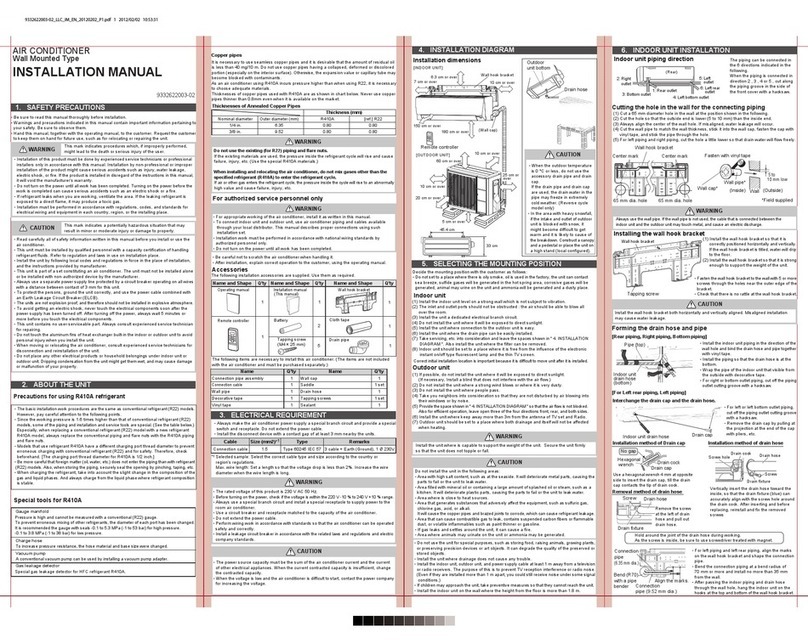
Fujitsu
Fujitsu ASYG 09 LLCA installation manual

York
York HVHC 07-12DS Installation & owner's manual
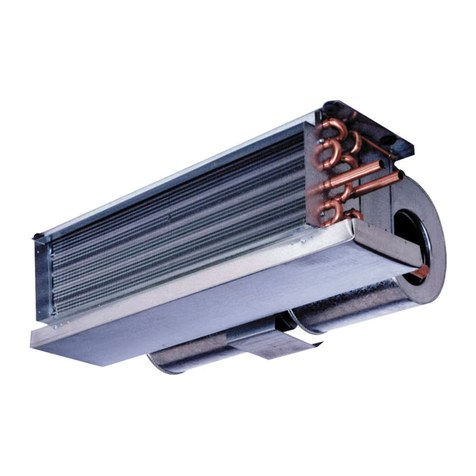
Carrier
Carrier Fan Coil 42B Installation, operation and maintenance manual
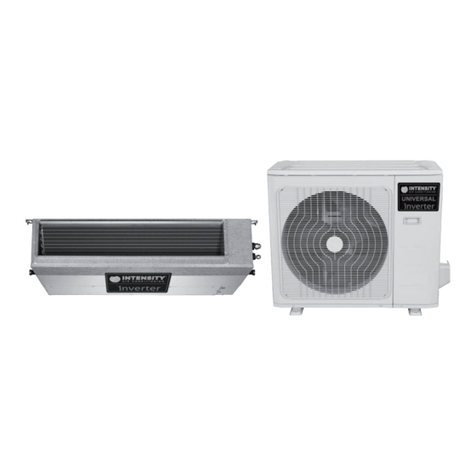
intensity
intensity IDUFCI60KC-3 installation manual
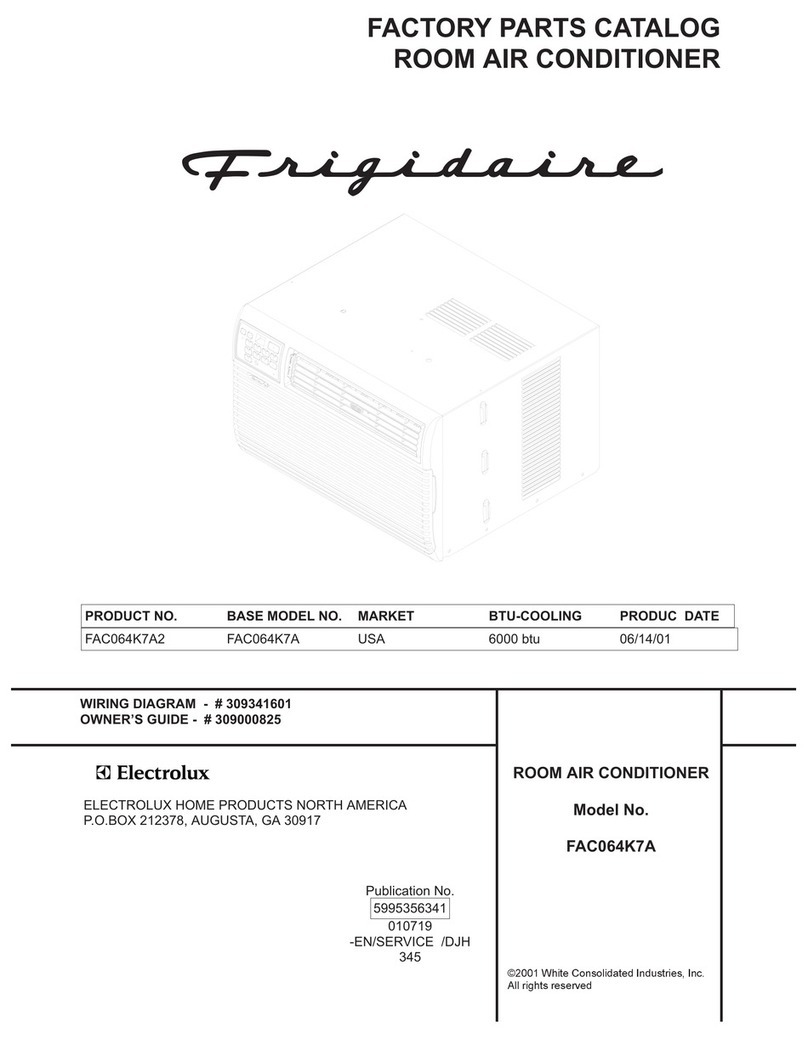
Frigidaire
Frigidaire FAC064K7A2 Factory parts catalog
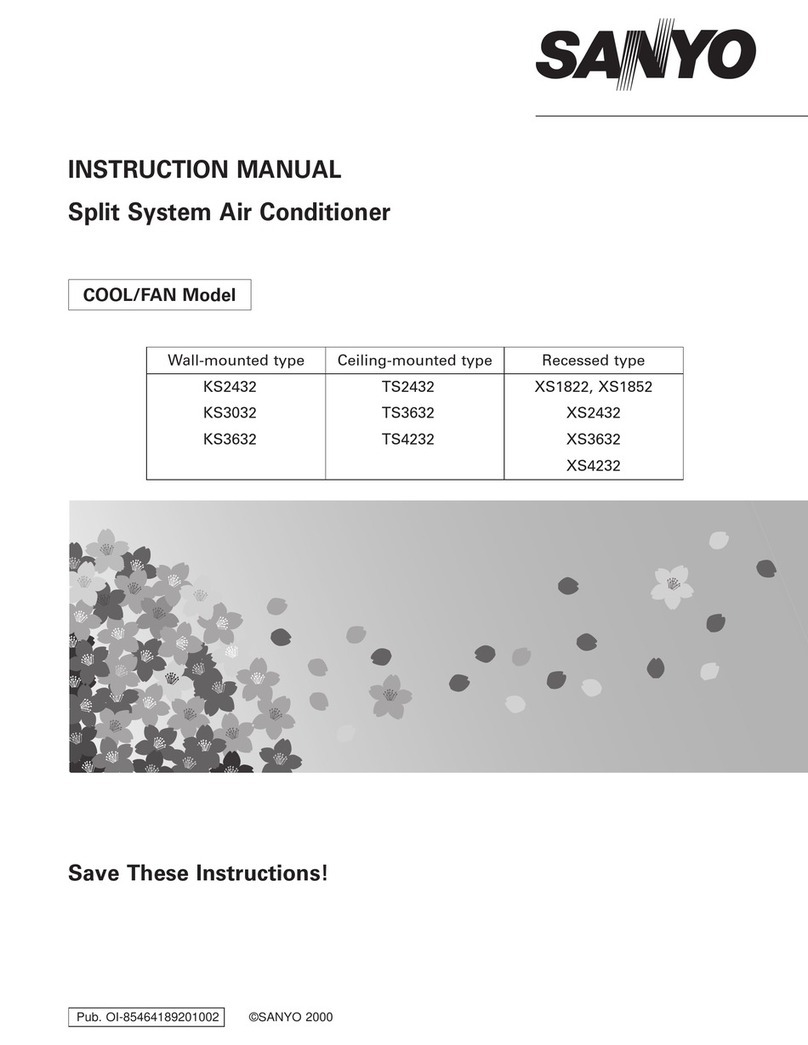
Sanyo
Sanyo KS2432 instruction manual

Mitsubishi Electric
Mitsubishi Electric PUHZ-RP50VHA4 Service manual
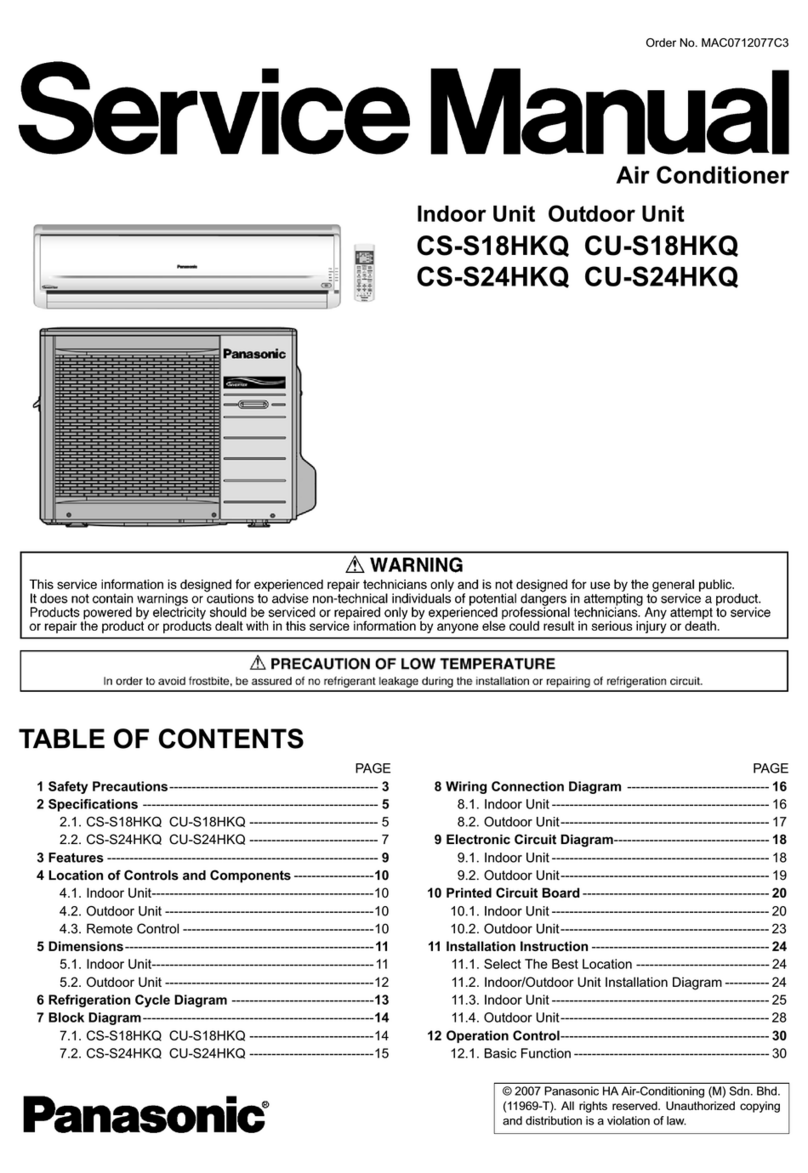
Panasonic
Panasonic CS-S18HKQ Service manual
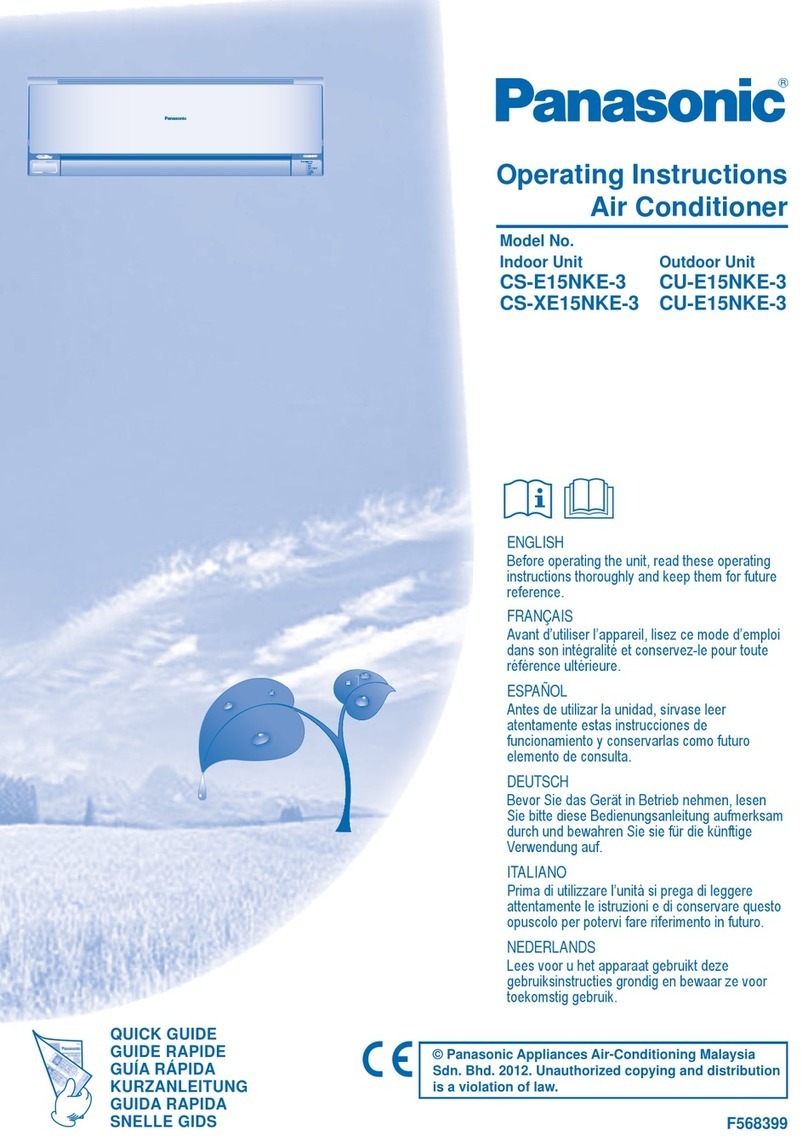
Panasonic
Panasonic CS-E15NKE3 operating instructions
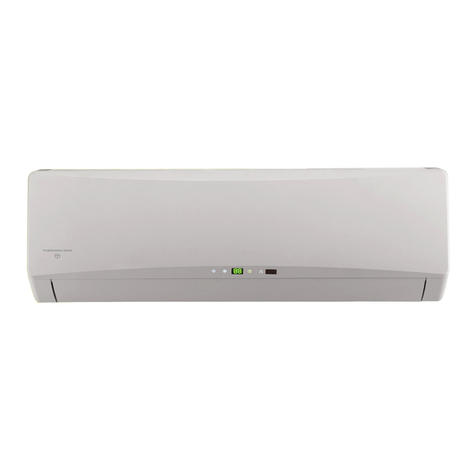
Gree
Gree GWH18TC-K3DNA1B/I Service manual
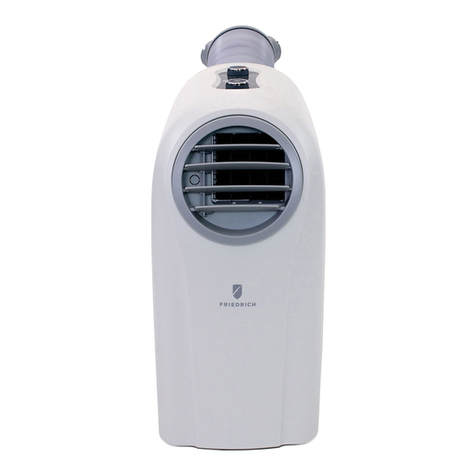
Friedrich
Friedrich ZoneAire Compact P08SA owner's manual

Daikin
Daikin R32 Split Series installation manual
